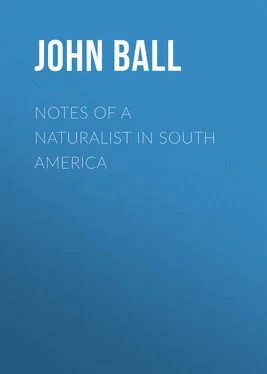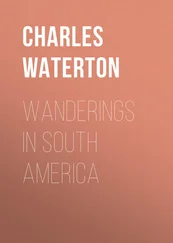John Ball - Notes of a naturalist in South America
Здесь есть возможность читать онлайн «John Ball - Notes of a naturalist in South America» — ознакомительный отрывок электронной книги совершенно бесплатно, а после прочтения отрывка купить полную версию. В некоторых случаях можно слушать аудио, скачать через торрент в формате fb2 и присутствует краткое содержание. Жанр: foreign_antique, foreign_prose, на английском языке. Описание произведения, (предисловие) а так же отзывы посетителей доступны на портале библиотеки ЛибКат.
- Название:Notes of a naturalist in South America
- Автор:
- Жанр:
- Год:неизвестен
- ISBN:нет данных
- Рейтинг книги:4 / 5. Голосов: 1
-
Избранное:Добавить в избранное
- Отзывы:
-
Ваша оценка:
- 80
- 1
- 2
- 3
- 4
- 5
Notes of a naturalist in South America: краткое содержание, описание и аннотация
Предлагаем к чтению аннотацию, описание, краткое содержание или предисловие (зависит от того, что написал сам автор книги «Notes of a naturalist in South America»). Если вы не нашли необходимую информацию о книге — напишите в комментариях, мы постараемся отыскать её.
Notes of a naturalist in South America — читать онлайн ознакомительный отрывок
Ниже представлен текст книги, разбитый по страницам. Система сохранения места последней прочитанной страницы, позволяет с удобством читать онлайн бесплатно книгу «Notes of a naturalist in South America», без необходимости каждый раз заново искать на чём Вы остановились. Поставьте закладку, и сможете в любой момент перейти на страницу, на которой закончили чтение.
Интервал:
Закладка:
The houses of the labouring population, whether in town or country, are mere sheds, seemingly of the frailest materials, the walls of thin upright boards, and roofed with small imbricated wooden shingles, such as one sometimes sees in Tyrol; but there must be a very substantial framework, or they would be annually carried away by the August hurricanes. The interiors appeared to be fairly clean, and in a country where cold is unknown good houses are luxuries, not necessaries of life.
CAUSES OF PROSPERITY.
One need not go far to seek the explanation of the superior condition of Barbadoes as compared with the other West Indian Islands. Unlike these, there was here no waste land; every acre was occupied, and the emancipated negro could not follow the very natural but unfortunate instinct which elsewhere led him to squat in idleness, supporting life on a few bananas and other produce that cost but a few days’ labour in the year. Apart from this, it is said that the Barbadoes, unlike the Jamaica, planters showed practical intelligence in at once recognizing the new conditions created by the Act of Emancipation, and, by offering fair wages and giving their personal influence and supervision, helping to convert the slave into an industrious freeman. Whatever poets may have fancied of the delights of lotus-eating, it seems to be true in the tropics, as well as in temperate climates, that there is more contentment and real enjoyment of life among people who are held to regular daily work – not excessive or exhausting – than among those who have little or nothing to do.
The house at which we were hospitably entertained, with no architectural pretensions, struck us as admirably suited to the climate. On the ground floor, several spacious and airy sitting-rooms opened on a broad verandah that ran round the building, and a number of fine trees close at hand, with the dense impervious foliage characteristic of the tropics, offered the alternative of sitting in the open air. One of the natural advantages of Barbadoes is the almost complete absence of noxious and venomous insects and reptiles. The frequency of poisonous snakes in some of the islands, especially Martinique and Sta. Lucia, must seriously interfere with the pleasures of a country life.
The voyage from Barbadoes to Jacmel, which occupied the greater part of three nights and two days, was highly enjoyable, but uneventful. With a temperature of about 80° in the shade, and a pleasant breeze from the north-east, life on deck was much more attractive than any occupation in the cabins, and nothing more laborious than reading an interesting book, such as Tschudi’s “Travels in Peru,” or at the utmost some brushing up of nearly forgotten Spanish, could be undertaken. In the early morning, the rising of the coveys of flying-fish as the steamer disturbed them from their rest on the surface, with their great silvery fins glancing in the level rays of the sun, was always an attractive sight. They certainly often change the direction of their flight as they momentarily touch the surface, but I could not satisfy myself whether this depended on a muscular effort of the animal, or merely on the angle at which it happened to strike the irregular surface of the little dancing waves that surrounded us.
JACMEL IN HAYTI.
About sunrise on the 2nd of April the anchor was let go, and we found ourselves in the harbour of Jacmel, the only port on the south side of the great island of Hayti. The Royal Mail steamers call here periodically to deliver letters and to receive a bag which, after due fumigation and such other incantations as are deemed proper, is delivered at the end of a long pole. The entire island being supposed to be constantly subject to zymotic diseases, especially small-pox which is the great scourge of the negro race, no further communication with the shore is permitted, and within less than two hours we were again under way. The hills surrounding the harbour are apparently covered with forest, the trees being of no great size, but of the most brilliant green; but I could detect no dwellings of a superior class such as Europeans would be sure to construct in picturesque and healthy spots near a seaport. As we ran for more than twenty miles very near the coast, I could at first detect here and there small patches of cleared ground with sheds or huts; but beyond the distance of a few miles these ceased, and no token of the presence of man was discernible.
Making large allowance for exaggeration, and having had the opportunity of correcting some loose reports by the more careful and accurate information afterwards received from a gentleman who resided for some time at Port au Prince as the representative of a European power, it is impossible for me to avoid the conclusion that, in the hands of its black possessors, this noble island has retrograded to a condition of savagery little, if at all, superior to that of the regions of tropical Africa whence they originally came.
There may be but slight foundation for the reports as to the revival of cannibal customs in the interior of the island; but it would seem that the sanguinary encounters so frequently recurring between the people of the rival republics between whom the island is divided, differ little in point of ferocity from those of Ashantee or Dahomey. The political institutions, caricatures of those of the United States, have produced in astonishing luxuriance all the abuses characteristic of different types of misgovernment, and the few men distinguished by superior intelligence and a desire for rational progress have sought in vain for support in efforts for reform. The condition of the two republics, Hayti and San Domingo, seems to be the reductio ad absurdum of the theories which ascribe to free institutions an inherent power of promoting human progress.
April 3 was a day to be long remembered. Barbadoes to Jamaica is as Champagne or Mecklenburg compared to Switzerland or Tyrol, and now for the first time the dream of tropical nature became a reality. At six p.m. we passed Port Royal, and about seven had cast anchor at Kingston. The first impression on landing here is unfavourable. The buildings are mean, the thoroughfares and side-paths out of repair, the people in the streets seem to have nothing to do and to be doing it, the general air that of listlessness and neglect. Altogether the place contrasts disadvantageously with the ports of Spanish America, to say nothing of our own colonies. But Kingston was not to detain us, and the overpowering attraction was towards the range of the Blue Mountains, on which my eyes had been fixed all the morning as we approached the shore. We were told that we must return to the ship at five o’clock, so that it was hopeless to attempt to reach even the middle zone of the mountains, and all that could be done with advantage was to engage a carriage to a place called Gordontown, in a valley which is the ordinary route to Newcastle and other places in the mountains. After a delay which to our impatience seemed unreasonable, I started in a tolerable carriage with W – , an old friend who was proceeding to Lima as commissioner from the Court of Chancery to receive evidence in an important pending lawsuit, and who, although not a naturalist, gave effective and valuable help on this and other subsequent occasions in the work of plant-collecting.
EXCURSION IN JAMAICA.
For a distance of four or five miles the land slopes very gently from the coast towards the roots of the hills. This tract is partly occupied by sugar-plantations; but our road lay for some time among small country houses, each surrounded by pleasure-ground or garden. As the dry season was not yet over, the country here looked parched; but I saw many trees and shrubs new to me, many of them laden with flowers, and found it hard to keep my resolution not to stop the carriage until we should reach Gordontown. The excitement increased as we entered the valley, and the road began to wind up the slopes above the right bank of the torrent, where at every yard some new object came into view. It was near eleven a.m. when we reached the little inn, which, with four or five houses, make the station of Gordontown, where the carriage road ends, and horses are hired by those bound for Newcastle or other places in the hills. No time was to be lost, and we were speedily on our way to ramble up the valley, keeping as near as might be to the banks of the torrent.
Читать дальшеИнтервал:
Закладка:
Похожие книги на «Notes of a naturalist in South America»
Представляем Вашему вниманию похожие книги на «Notes of a naturalist in South America» списком для выбора. Мы отобрали схожую по названию и смыслу литературу в надежде предоставить читателям больше вариантов отыскать новые, интересные, ещё непрочитанные произведения.
Обсуждение, отзывы о книге «Notes of a naturalist in South America» и просто собственные мнения читателей. Оставьте ваши комментарии, напишите, что Вы думаете о произведении, его смысле или главных героях. Укажите что конкретно понравилось, а что нет, и почему Вы так считаете.












